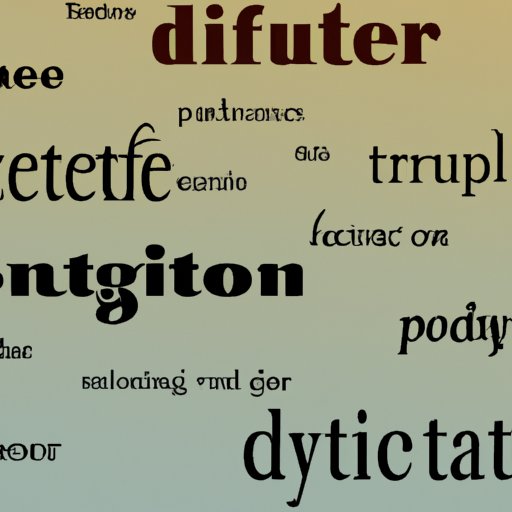Introduction
The use of language, or diction, is a crucial element of any piece of literature. Diction involves the author’s choice of words, which have a significant effect on the audience’s understanding of the work. This article provides a comprehensive guide to understanding diction in literature, from breaking down the elements of diction to examining the use of diction in different genres of literature.

A Guide to Understanding Diction in Writing
In order to understand the use of diction in literature, it is important to first break down the elements of diction. According to the Merriam-Webster dictionary, diction is defined as “the choice and use of words and phrases in speech or writing.” In other words, diction is the way that an author uses language to create a particular effect in their writing.
When analyzing diction, it is important to consider not only the words that are used, but also how they are used. Different word choices can significantly alter the meaning of a passage, so it is important to be mindful of how different words can influence the reader’s interpretation of the text. For example, if an author were to describe a character’s actions as “graceful,” this would suggest a certain level of elegance and poise. However, if the same character’s actions were described as “nimble,” this would suggest a more agile and quick-footed movement.

The Power of Diction: How It Affects Your Writing
Once you have a better understanding of how different word choices can influence meaning, it is important to explore how diction can create tone in a piece of writing. Tone is an important element of literature, as it conveys the author’s attitude towards the subject matter. The tone of a piece of writing can be affected by a variety of factors, including diction.
For example, if an author were to use formal language to describe a situation, this would convey a more serious and somber tone. On the other hand, if the same situation were described with informal language, this would suggest a more lighthearted and playful tone. It is important to consider how diction can be used to create the desired tone in a piece of writing.
In addition to creating tone, diction also has the power to influence the reader’s perception of the story and its characters. Different word choices can evoke different emotions in the reader, so it is important to be mindful of how your diction can shape the reader’s experience of the text.

An Analysis of Diction in Literary Classics
One of the best ways to gain insight into the use of diction in literature is to examine the works of renowned authors. William Shakespeare is one of the most famous examples of a masterful use of diction in literature. In his plays, Shakespeare was able to create vivid images with his word choice, painting a vivid picture for the reader.
Shakespeare was also known for his use of rhetorical devices, such as antithesis and parallelism, which further enhanced the impact of his writing. By examining the works of Shakespeare and other literary classics, we can gain valuable insight into the power of diction in literature.
Crafting Meaning Through Diction in Literature
In addition to creating tone and influencing the reader’s perception, diction can also be used to create a unique narrative voice in a piece of writing. By carefully crafting the language used in a story, an author can give their writing a distinct flavor and make it stand out from other works.
Diction can also be used to add depth and texture to characters in a story. By using specific language to describe a character’s thoughts and actions, an author can create a more vivid and detailed portrait of the character.
Examining the Use of Diction in Different Genres of Literature
It is also important to consider how diction is used in different genres of literature. For example, novels often rely heavily on descriptive language to bring the story to life, while poetry relies more heavily on the use of figurative language to create imagery. Plays, on the other hand, require a more direct style of dialogue in order to effectively convey the action of the play.
By examining the use of diction in different genres of literature, we can gain valuable insight into how to use diction to create the desired effect in our own writing.
Conclusion
In conclusion, diction is an essential element of literature, influencing the reader’s perception of a story and its characters. From analyzing how different word choices impact meaning to exploring how diction creates tone, this comprehensive guide has examined the role of diction in literature and the power it holds over a reader’s experience of a text.
By leveraging the power of diction, authors can craft meaningful stories that resonate with readers. As we have seen, the use of diction in literature can vary depending on the genre, so it is important to be mindful of how different word choices can affect the reader’s experience of the text.
(Note: Is this article not meeting your expectations? Do you have knowledge or insights to share? Unlock new opportunities and expand your reach by joining our authors team. Click Registration to join us and share your expertise with our readers.)
